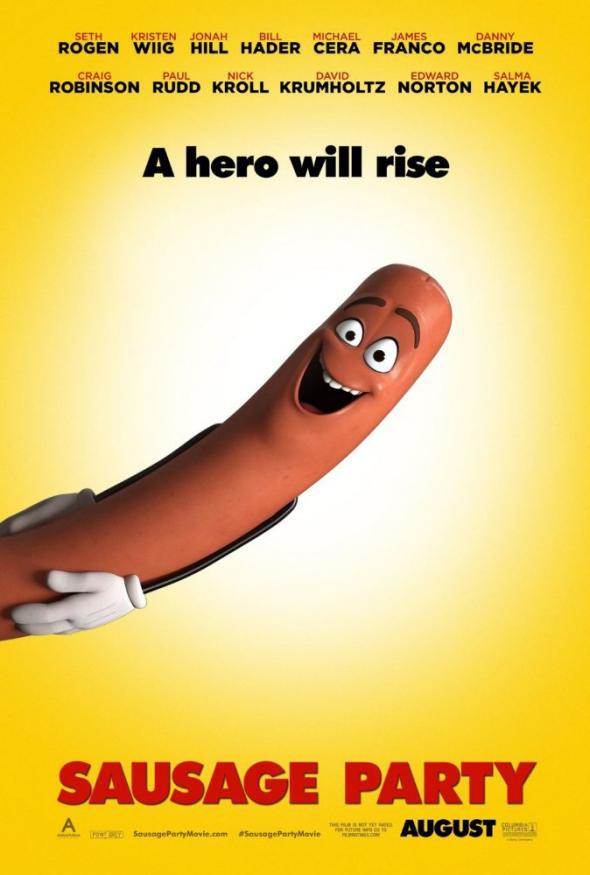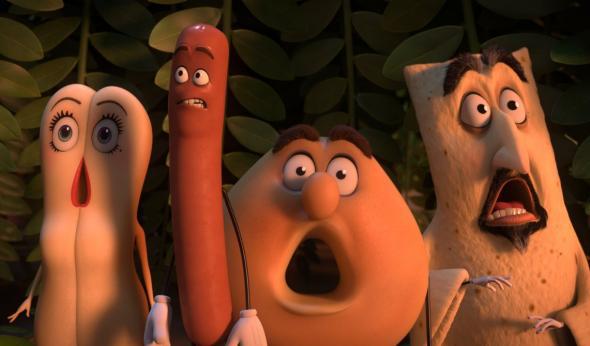This post originally appeared on Strong Language, a sweary blog about swearing.
As far as strong language goes, sausage party is hardly spicy. It’s a mild slang term for a social gathering in which men greatly outnumber women, usually expressed with a sense of bro-ish disappointment by its male members, er sausages. But a new adult computer-animated movie, Sausage Party, is getting a big rise out of its ham-handed innuendo.
Sausage Party follows Frank, a phallic hot dog (voiced by Seth Rogen) on a dick joke–stuffed “quest to discover the truth about his own existence.” Its theatrical release posters relish in visual gags and puns:

IMDB
Another poster runs “Get your fill,” with our frisky frankfurter smacking lips with his bun-y belle. The trailer makes clear the movie doesn’t scrimp on the fixings: plenty of fucks and sexual slang win this flick an R rating in U.S. cinemas.
The film also features Frank’s girlfriend, a very vaginal hot dog bun (Kristen Wiig); a lesbian character anthropomorphized as a taco (Salma Hayek); and a douche, a douche douche, who breaks his nozzle (Nick Kroll). Many younger viewers, familiar with the popular douche-nozzle pejoration, may well learn the term’s literal antecedent thanks to this comedy. The rest of the Sausage Party’s starring cast, true to its title, are men.
So, as Sausage Party swells at the box office, let’s have a little taste of the history of the term. The earliest sausage parties, of course, were actual sausage parties: dinners and cookouts that served the meat. Still, the references can bring some chuckles to the modern reader.
English writer W. Blanchard Jerrold’s 1848 The Disgrace to the Family: A Story of Social Distinctions includes a chapter called “Mrs. Grumblebum’s Sausage Party.” In it, the titular character enjoys “a sausage-dinner with a very select dinner party.” The chapter even opens with the perfect setup for some profanity: “The heading of this chapter will give the reader a presentiment of some vulgar details upon a very vulgar subject…” But alas, the payoff is not a dick joke: It’s “eating,” Jerrold reveals.
In her 1898 Four-footed Americans and their Kin, a sort of georgic novel, American author Mabel Osgood Wright also provides some laughs: “a sausage party is great fun, with dogs for the company…Dogs are crazy about sausages. Ours always lick their lips whenever Manny Bun cooks any.”
Sausage parties throughout the 20th century refer to various local social traditions, behaving much like a weenie roast or barbecue today. A 1922 Lyre of Alpha Chi Omega mentions an annual sausage party its sorority held in February. London’s Punch notes in 1936 that Mayfair held its first sausage party. The North Dakota Legislature made sure to record its gratitude for its biennial sausage party in 1971. And a 1989 Swiss Scene observes the challenge of keeping the sausage party tradition in a changing cultural landscape.
It’s unclear if any de facto sausage party is responsible for the slang term. One could imagine an actual sausage party, say, a university grill-out, inspiring the lingo. But sausage (and its many related forms, like “pork sausage”) has long been slang for “penis,” so its attributive use with party seems just as likely. (For more penis slang, enjoy our very own Jonathon Green‘s timeline on the term. Green even notches a colorful “yoghurt-spitting sausage” in 2012.)
And sausage party has its competitors, such as sausage fest, meat market, and weenie roast. Sausage party, at least according to my all-too-surface analysis, beats out sausage fest, while weenie roast appears to prevail as a name for actual hot dog–serving cookouts—and perhaps because partygoing dudes would feel emasculated if they joked about showing up at a weenie roast. More piquant varietals include cock fest and dick fest.
Whatever the case, sausage party seems to bend toward its slang usage in the 1990s. One early citation—in a 1999 Bureau of National Affairs Fair Employment Practice Cases—concerns harassment in the workplace, with an employee making homophobic statements about a co-worker having a “sausage party.” Sausage party seems squeezed into its current lexical casing come the early 2000s. In 2002, professor Connie Eble included it in her long-running Campus Slang: University of North Carolina at Chapel Hill lists. Urban Dictionary enters sausage party by spring of 2003. A 2004 slang guide, Turd Ferguson & the Sausage Party, defined the term for incoming college students. And a 2010 novelty website, called Sausage Party, once measured the expected “sausageocity” of an upcoming Facebook event.
Now, with the popular and critical success of Sausage Party, we should expect sausage party to fully bust out of its frat-house bro-talk and penetrate the mainstream.
